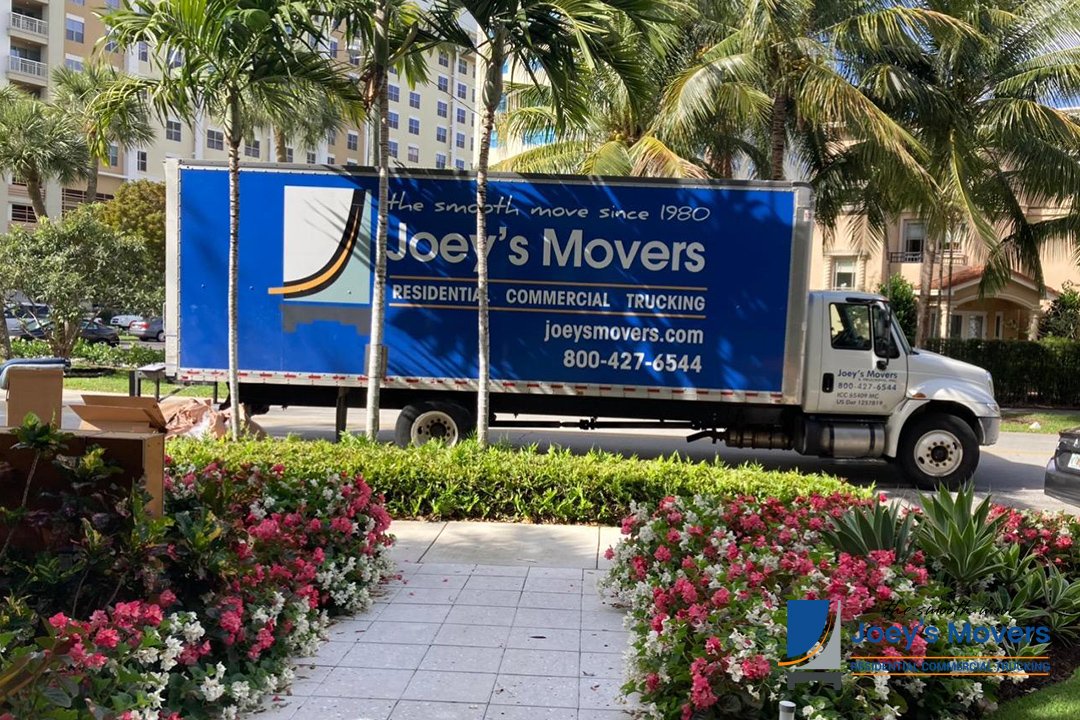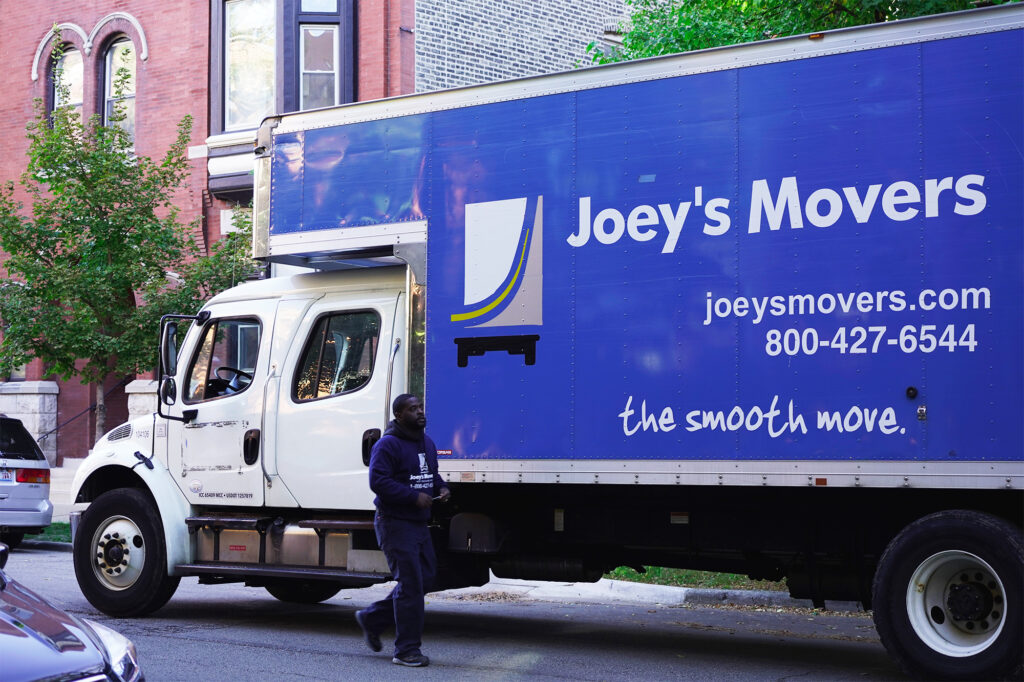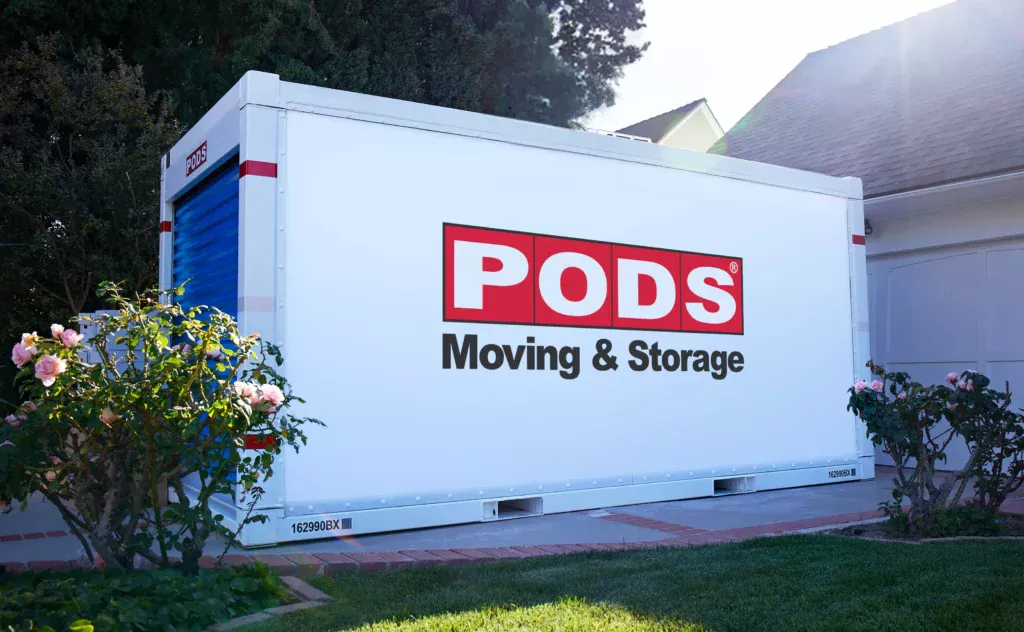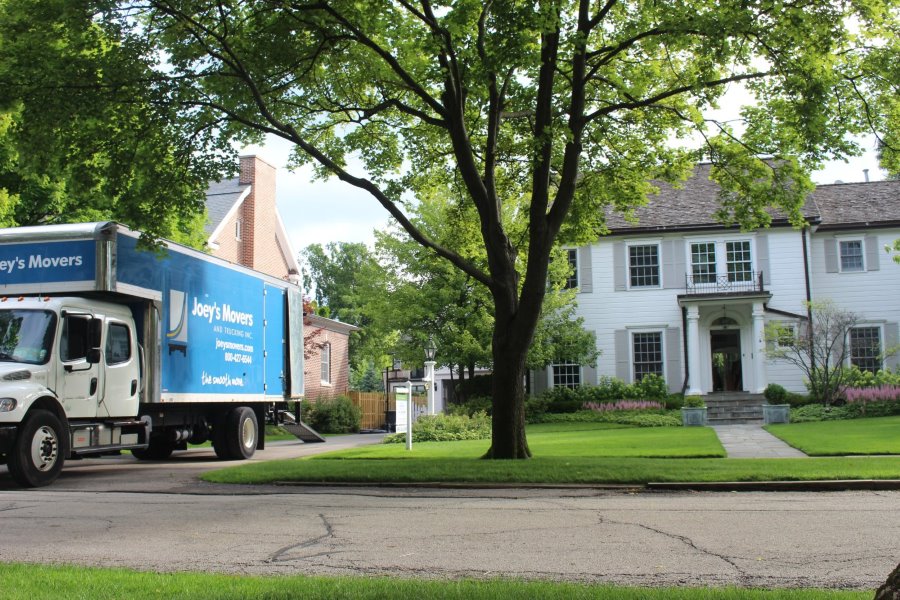The Challenges of a Cross-Country Move
Moving cross country presents different challenges from a local move. Transporting your belongings hundreds or thousands of miles requires meticulous planning, careful budgeting, and choosing the right moving service. From coordinating departure and arrival dates to ensuring your belongings arrive safely and on time, cross-country moves demand attention to detail at every step. Joey’s Movers is dedicated to providing stress-free moves, whether you’re moving across the country or across the street.
Ready for a stress-free cross-country move? Call (847) 674-7779 or request your free personalized quote from Joey’s Movers today!
Why Choosing the Right Cross-Country Movers Matters
When researching long-distance moving companies, your choice will significantly impact your moving experience. Professional cross-country movers are experts in safely transporting and delivering your possessions across state lines. They know interstate regulations, have the proper equipment, and provide insurance coverage that DIY options lack. While the upfront cost may be higher, the peace of mind, time saved, and reduced physical strain generally make professional movers worth it for people planning a long-distance relocation.
What Are Cross Country Movers?
Full-Service vs. DIY Moving Companies
When planning an interstate move, you’ll quickly learn there are several different service levels:
- Full-service moving companies handle every aspect of your move, from packing your belongings and disassembling furniture to loading, transporting, unloading, and setting up at your new home. Joey’s Movers offers tailored services to match your specific needs, making the entire process stress-free
- Self-pack moving services allow you to pack your belongings while professionals handle the transportation.
- Truck Rentals: This complete DIY approach involves renting a moving truck and handling all aspects of the move yourself, from packing and loading to driving and unloading.
What Services Do Cross Country Moving Companies Offer?
Long-distance moving companies typically provide a range of services to accommodate different needs and budgets, including:
- Packing services using high-quality materials and techniques to ensure your belongings are protected.
- Loading and unloading by trained crews.
- Fleets of trucks specifically designed for long-distance moves.
- Short-term or long-term storage options
- Specialty item moving for pianos, artwork, antiques, and other items requiring special handling.
Cross Country Movers’ Cost Breakdown
How Much Does It Cost to Move Cross Country?
The cost of hiring cross-country movers varies widely based on numerous factors. For a typical 2-3 bedroom home, expect to pay between $4,000 and $10,000 for a full-service move across the United States. Self-pack options or container services like PODS generally range from $2,000 to $5,000, while truck rentals cost $1,500 to $3,000 before accounting for fuel, lodging, and other expenses.
Factors That Affect Moving Costs
Several key variables influence your final cross-country movers’ cost:
- Distance
- Weight and volume of belongings you’re moving
- Additional services such as packing and unpacking, furniture disassembly, and reassembly.
- Time of year: Peak moving season commands higher rates
- Difficult access, such as narrow streets, many stairs, or long walking distances from the truck to your door
- Insurance coverage
- Fuel costs
Hidden Fees to Watch For
Be vigilant about potential extra charges that might not appear in your initial quote. These include:
- Stair and elevator fees
- Long carry fees
- Bulky item charges
- Packing material costs
- Storage fees
- Express delivery upcharges
Comparing Cross Country Moving Options
Full-Service Moving Companies
The best cross-country moving companies provide comprehensive services that minimize your involvement in the physical aspects of relocation:
- Joey’s Movers: We specialize in seamless cross-country relocations with personalized service plans, Joey’s Movers offers transparent pricing, experienced crews, and excellent customer support.
- United Van Lines/Mayflower/Allied: These national carriers have extensive networks and decades of experience handling interstate moves.
- Two Men and a Truck: Originally known for local moves, this company has expanded to offer long-distance services with a focus on customer care.
When evaluating full-service movers, consider their track record with long-distance relocations specifically, as these moves require different expertise than local ones.
PODS vs. Cross Country Movers
Portable storage containers offer a flexible middle ground between DIY and full-service options that typically cost less than full-service movers, with average prices ranging from $2,000-$5,000 for cross-country moves. There are pros and cons to using PODS:
Pros:
- Flexible loading and unloading timeline
- Potential for lower overall costs
- Combined transportation and storage solution
Cons:
- Limited availability in some areas
- Placement issues in urban environments or multi-unit buildings
- Additional costs for loading and unloading help
- Less protection for fragile items unless professionally packed
U-Haul vs. Cross Country Movers
Many people think U-Haul offers big savings, but is renting a truck really more economical?
U-Haul’s advertised rates start as low as $1,500 for a cross-country move, but the final expense often climbs considerably.
Hidden Costs of Truck Rental:
- Fuel expenses (large trucks get poor gas mileage)
- Additional insurance coverage
- Hotel stays during multi-day drives
- Meals on the road
- Potential time off work
- Packing supplies and equipment rental
- Physical toll and stress
What Is the Cheapest Way to Move Cross Country?
Cost-Saving Strategies
Regardless of which moving method you choose, these tactics can help reduce your expenses:
- Book in advance
- Move during off-peak times
- Downsize before moving
- Compare multiple quotes
- Negotiate your rates
- Look for free supplies
DIY vs. Professional Moving Services
The most budget-friendly approach is typically moving only what fits in your personal vehicle and selling or donating everything else, but this isn’t practical for most households. Consider these guidelines when deciding between DIY and professional services:
DIY Makes Sense When:
- You’re moving minimal belongings
- You have experience driving large vehicles
- You have friends or family who can help at both ends
- You have plenty of time to handle all aspects of the move
- You’re physically capable of lifting and carrying heavy items
- You’re comfortable with the responsibility of packing items properly
Professional Services Make Sense When:
- You’re moving a full household
- Your time is limited or valuable
- You have many fragile or valuable items
- The physical labor would be challenging
- You don’t have experience with large-scale moves
- Your peace of mind is worth the additional cost
Long-Distance Moving Discounts & Deals
Many moving companies offer special rates for certain groups:
- Military
- Students
- Seniors
- Corporate relocation programs
- Seasonal promotions:
- Bundle discounts when you combine multiple services like packing, moving, and storage.
Call our office at (847) 674-7779for the lastest discounts!
How to Choose the Best Cross-Country Movers
What to Look for in a Reliable Moving Company
When researching the best cross-country moving companies, verify these essential credentials:
- Proper licensing
- Adequate insurance
- Positive reviews
- Years in business
- Transparent pricing
- Dedicated staff
How to Get an Accurate Quote
The difference between estimated and final costs can be significant if you don’t get the right type of quote:
- Binding Estimates: These guarantee your price won’t increase unless you add services or items to your inventory.
- Non-Binding Estimates: These are based on the estimated weight of your belongings and can change once the actual weight is determined.
- In-Home Surveys: The most accurate quotes come from in-person assessments of your belongings, though video surveys have become increasingly common and reliable.
When requesting estimates, be completely honest about:
- All the things you plan to move
- Any challenges at either location
- Exact addresses
- Any specialty items requiring special handling
Red Flags to Avoid When Hiring Movers
Watch for these warning signs that might indicate a less reputable company:
- Unusually low prices
- Large upfront deposits required
- No physical address
- Generic email addresses
- Blank or generic paperwork
- High-pressure sales tactics
- Name changes
- Brokers vs. direct movers: Brokers will subcontract your move
FAQs
What is the cheapest way to move across the country?
The cheapest method is to only move what fits in your personal vehicle. For larger households, a combination of downsizing dramatically, asking friends for help, renting a truck yourself, and collecting free packing materials can minimize costs.
Is it cheaper to use PODS or a moving company?
PODS and other container services appear less expensive at the start, but the actual cost will depend on your specific situation. Container services may be cheaper if:
- You’re willing and able to handle all packing, loading, and unloading
- You have access to free loading help at both ends
- Your locations can accommodate container placement
- You don’t have many fragile items requiring professional packing
If you need to hire help for loading and/or unloading, the price difference may diminish significantly.
Is U-Haul the cheapest way to move?
U-Haul typically offers the lowest base rates among truck rental companies. However, their final cost increases substantially when you include:
- Per-mile charges
- Fuel costs (approximately 8-10 mpg for large trucks)
- Additional insurance
- Equipment rentals (dollies, furniture pads)
- Hotel stays during travel
- Food expenses
- Potential time off work
For shorter moves, U-Haul might be most economical, but for true cross-country relocations, the total expense often approaches that of hybrid moving services.
Final Moving Advice
Choosing the right cross-country movers balances cost, convenience, and peace of mind. Research the options thoroughly, keeping in mind that the lowest advertised price rarely represents the total expense or value of the service provided.
When evaluating moving companies, prioritize those with proven track records, clear communication, transparent pricing, and proper credentials over those offering seemingly bargain rates. Remember to ask potential movers these critical questions:
- Are you a broker or an independently owned company?
- Will your employees handle my belongings, or do you use day laborers?
- What factors could change my quoted price?
- Can you provide proof of licensing and insurance?
- Can I speak with recent customers who completed similar long-distance moves?
Whatever option you choose, start planning early, compare multiple quotes, and get everything in writing. Your successful cross-country move begins with making informed decisions based on your specific needs, budget, and circumstances.
Ready to experience a seamless cross-country move? Contact Joey’s Movers today at (847) 674-7779 or request a free personalized quote and discover why we’re trusted by families nationwide for reliable, professional long-distance moving services!






